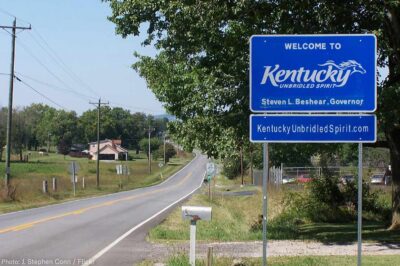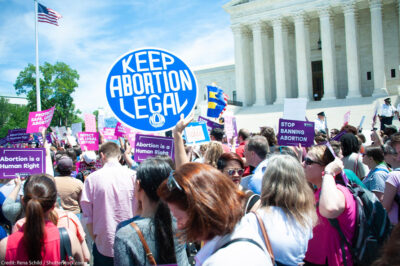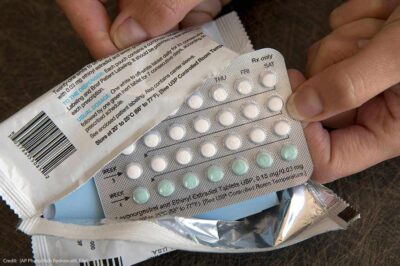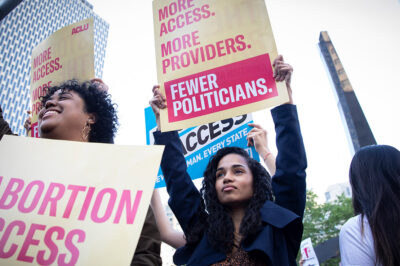
THE NATIONAL ARCHIVES made a censorship decision to protect us from our democracy. Their decision was a move too many countries would have taken if the initial event that brought about the National Archives to act had even been allowed to take place. We are supposed to be different, we are supposed to have civil liberties that the government protects and promotes our rights. The person / persons who made the decision to and actually censored the photos need to be punished, best will be if they are fired, removed from federal employment, From the ACLU and the Washington Post.....
Altering the photo — and thereby rewriting history — was nothing less than Orwellian.
Louise Melling ,
January 22, 2020

“God hates Trump.”
“If my vagina could shoot bullets, it’d be less REGULATED.”
“Trump & GOP – Hands Off.”
“This pussy grabs back.”
Last week, the Washington Post revealed that the National Archives — the government body charged with documenting and preserving records — had doctored four protest signs in a photograph of the 2017 Women’s March. The photo was displayed as part of an exhibit, “Rightfully Hers: American Women and the Vote.” The signs had the slogans referenced above. The words crossed out were blurred.
Doctoring the photo was nothing less than Orwellian. Instead of documenting history, the National Archives had altered history to mask criticism of the president and erase our bodies. We’re demanding answers.
The photo the National Archives doctored was of a protest about the country’s, and the president’s, treatment of women. The National Archives decided our protest was too controversial, and therefore unmentionable.
The signs used the word “pussy” because the president himself notoriously said it. But when we talk about our own bodies, all too often we are shamed, punished, or outright banned from speaking. Just a few years ago, Lisa Brown, a Michigan legislator, was found to have violated the legislature’s rules of decorum when, during a heated abortion debate, she said, “I’m flattered that you’re all so interested in my vagina, but ‘no’ means ‘no.’” Instagram didn't allow photos of breastfeeding until 2014. Ads for post-partum health care and menstrual products have faced resistance in recent years because they speak of vaginas or periods.
The hypocrisy of altering a photograph to avoid controversy of the president’s own making rightly put the agency at the center of a political storm.
The National Archives initially defended its action, saying it blurred references to the president’s name and our bodies “so as not to engage in current political controversy” and to avoid content that might be inappropriate for young visitors. The agency was honest about its aims — to change history to suit its own, more comfortable, narrative.
Faced with an outpouring of criticism, the agency later apologized in a statement, saying it was a “mistake” to alter the images. But a mistake is tripping and spilling coffee on the photo. Blurring signs critical of Trump or referencing women’s bodies is a deliberate act — an apology alone won’t cut it.
In a Freedom of Information Act request filed today, we’re demanding the National Archives release all records answering for how this happened, who ordered the decision to alter the photo, and what guidelines they used to inform the decision. Perhaps most importantly, the agency needs to tell the public what other photos, if any, have been altered.
As the National Archives astutely observes in its mission statement, “Public access to government records strengthens democracy by allowing Americans to claim their rights of citizenship, hold their government accountable, and understand their history so they can participate more effectively in their government.”
Controversy is central to a robust democracy. If we begin to let the government rewrite history to make it more comfortable or less controversial, we set ourselves on a destructive path.
The National Archives has compromised the public’s trust that it will faithfully execute its thankless yet critical task of documenting and preserving history. As a first step to restoring that trust, the National Archives must be fully transparent and make public all records concerning its troubling decision to rewrite history. We can’t — and won’t — rest until it does.
More in Reproductive Freedom
 | ||||||||||||||||||||
| This week's best reads from the front lines of the fight for civil liberties. | ||||||||||||||||||||
|
| |||||||||||
| |||||||||||
| This email was sent by: American Civil Liberties Union 125 Broad Street, 18th Floor New York, NY 10004, USA |
National Archives exhibit blurs images critical of President Trump

The original, unaltered photo of the 2017 Women’s March in the District. An altered version appears in an exhibit at the National Archives. (Mario Tama/Getty Images)
Jan. 17, 2020 at 6:54 p.m. EST
But a closer look reveals a different story.
The Archives acknowledged in a statement this week that it made multiple alterations to the photo of the 2017 Women’s March showcased at the museum, blurring signs held by marchers that were critical of Trump. Words on signs that referenced women’s anatomy were also blurred.
In the original version of the 2017 photograph, taken by Getty Images photographer Mario Tama, the street is packed with marchers carrying a variety of signs, with the Capitol in the background. In the Archives version, at least four of those signs are altered.
A placard that proclaims “God Hates Trump” has “Trump” blotted out so that it reads “God Hates.” A sign that reads “Trump & GOP — Hands Off Women” has the word Trump blurred out.

A sign in the original, unaltered photo of the 2017 Women’s March on Washington. (Mario Tama/Getty Images)

An altered version of the sign as it appears in the photograph shown at the National Archives. (Salwan Georges/The Washington Post)
Signs with messages that referenced women’s anatomy — which were prevalent at the march — are also digitally altered. One that reads “If my vagina could shoot bullets, it’d be less REGULATED” has “vagina” blurred out. And another that says “This Pussy Grabs Back” has the word “Pussy” erased.
The Archives said the decision to obscure the words was made as the exhibit was being developed by agency managers and museum staff members. It said David S. Ferriero, the archivist of the United States who was appointed by President Barack Obama in 2009, participated in talks regarding the exhibit and supports the decision to edit the photo.
“As a non-partisan, non-political federal agency, we blurred references to the President’s name on some posters, so as not to engage in current political controversy,” Archives spokeswoman Miriam Kleiman said in an emailed statement. “Our mission is to safeguard and provide access to the nation’s most important federal records, and our exhibits are one way in which we connect the American people to those records. Modifying the image was an attempt on our part to keep the focus on the records.”
Archive officials did not respond to a request to provide examples of previous instances in which the Archives altered a document or photograph so as not to engage in political controversy.
Kleiman said the images from the 2017 and 1913 marches were presented together “to illustrate the ongoing struggles of women fighting for their interests.”
The decision to blur references to women’s genitals was made because the museum hosts many groups of students and young people and the words could be perceived as inappropriate, Kleiman said in the statement.
Kleiman said the National Archives “only alters images in exhibits when they are used as graphic design components.”
“We do not alter images or documents that are displayed as artifacts in exhibitions,” she said. “In this case, the image is part of a promotional display, not an artifact.”
When told about the action taken by the Archives, prominent historians expressed dismay.
"There's no reason for the National Archives to ever digitally alter a historic photograph," Rice University historian Douglas Brinkley said. "If they don't want to use a specific image, then don't use it. But to confuse the public is reprehensible. The head of the Archives has to very quickly fix this damage. A lot of history is messy, and there's zero reason why the Archives can't be upfront about a photo from a women's march."
Wendy Kline, a history professor at Purdue University, said it was disturbing that the Archives chose to edit out the words "vagina" and "pussy" from an image of the Women's March, especially when it was part of an exhibit about the suffragist movement. Hundreds of thousands of people took part in the 2017 march in the District, which was widely seen as a protest of Trump's victory.
"Doctoring a commemorative photograph buys right into the notion that it's okay to silence women's voice and actions," Kline said in an email. "It is literally erasing something that was accurately captured on camera. That's an attempt to erase a powerful message."
The altered photograph greets visitors to "Rightfully Hers: American Women and the Vote," an exhibit that opened in May celebrating the centennial of women's suffrage. The 19th Amendment to the Constitution, which was ratified in 1920, prohibits the federal government and states from denying the right to vote on the basis of sex.
"This landmark voting rights victory was made possible by decades of suffragists' persistent political engagement, and yet it is just one critical milestone in women's battle for the vote," reads a news release announcing the exhibit on the Archives website.
Archives spokesman John Valceanu said the proposed edits were sent to Getty for approval, and Getty "then licensed our use of the image."
A Getty spokeswoman, Anne Flanagan, confirmed that the image was licensed by the National Archives Foundation but said in an email Friday evening that Getty was still determining whether it approved alterations to the image.
Karin Wulf, a history professor at the College of William & Mary and executive director of the Omohundro Institute of Early American History and Culture, said that to ensure transparency, the Archives at the very least should have noted prominently that the photo had been altered.
"The Archives has always been self-conscious about its responsibility to educate about source material, and in this case they could have said, or should have said, 'We edited this image in the following way for the following reasons,' " she said. "If you don't have transparency and integrity in government documents, democracy doesn't function."





No comments:
Post a Comment